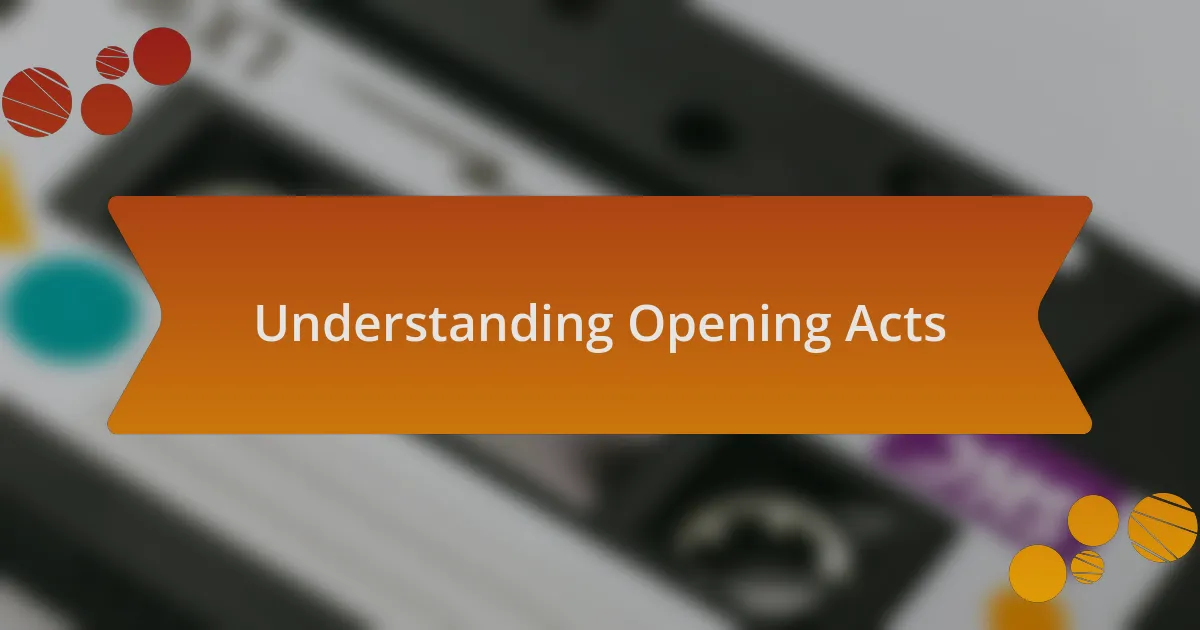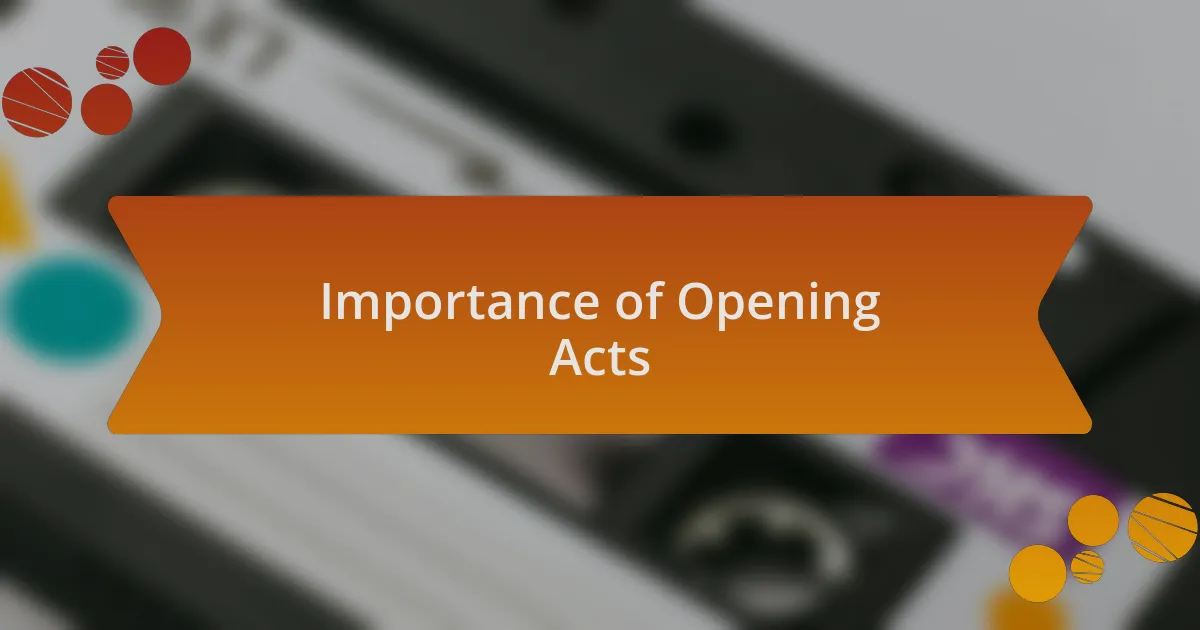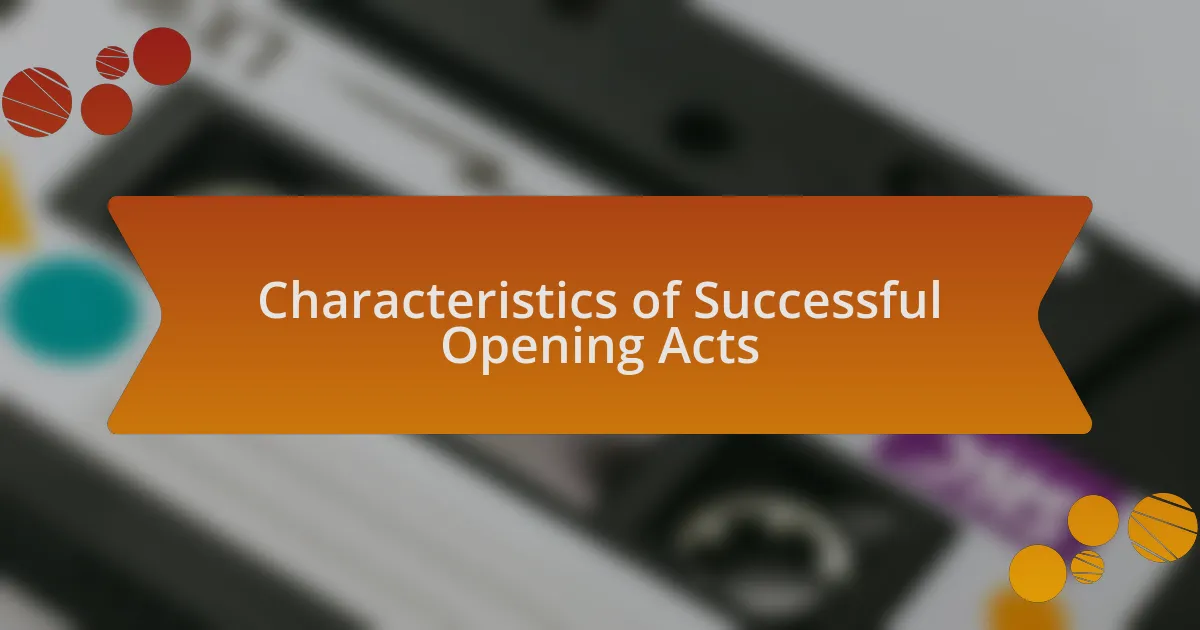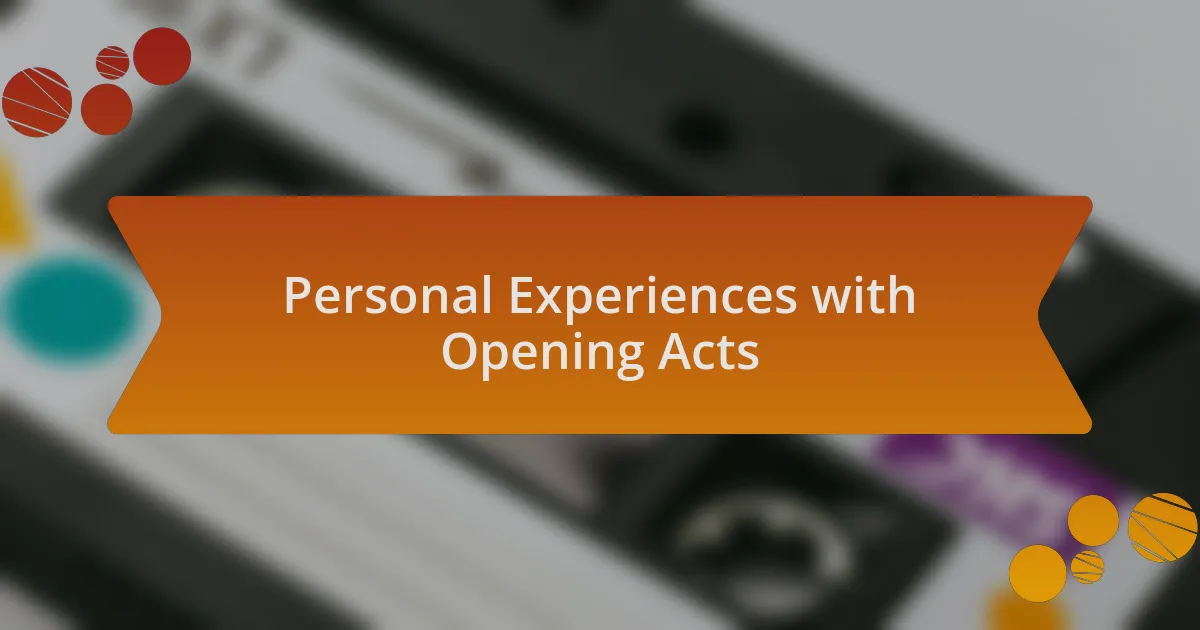Key takeaways:
- Opening acts play a crucial role in setting the mood and engaging the audience, often leaving a significant impression during live events.
- They offer emerging artists a platform to showcase their talent, potentially building a fanbase from scratch.
- Successful opening acts are adaptable and possess a unique flair, enhancing their performance and creating memorable experiences.
- Personal experiences with opening acts can evoke deep emotions and showcase the resilience and passion of these performers, even in challenging situations.

Understanding Opening Acts
Opening acts are often the unsung heroes of live music events. They set the stage not just literally but also metaphorically, creating an electric atmosphere that primes the audience for the headliner. I remember my first time witnessing a brilliant opening act; the energy in the room shifted as the crowd warmed up, and I found myself unexpectedly captivated by their performance.
These acts often share a unique connection with the audience, bringing an authenticity that resonates deeply. I’ve found that sometimes, the emotions conveyed by opening acts can be just as profound as those of the main event. Have you ever been so entranced by an opener that you forgot you were waiting for someone else? It’s these moments of spontaneity and surprise that can leave a lasting impression.
Moreover, understanding the role of opening acts means recognizing their potential for growth. Supporting acts often take risks and experiment with their sound, a factor that always intrigues me. I recall a night when an opening band tried out new material, and although they were met with mixed reactions, their passion was undeniable. These experiences remind us that every artist starts somewhere, and sometimes, the stars of tomorrow are found in the shadows of the stage today.

Importance of Opening Acts
Opening acts are essential in shaping the overall experience of a show. I once attended a concert where the opener completely rewrote the mood; their set was a blend of raw energy and genuine connection that drew everyone in. It made me realize how crucial these performers are for warming up the crowd, creating an undeniable excitement that carries over to the headlining act.
Additionally, I’ve often pondered the impact of opening acts on new artists. They provide a platform to showcase talent that might otherwise go unnoticed, and it’s fascinating to see how they capture the audience’s attention. I remember a particular night when an unknown band played to a half-filled venue, and by the end of their set, folks were chanting for more. How often do we underestimate the power of an opener to build a fanbase from the ground up?
Moreover, opening acts can serve as a reflection of cultural trends and shifts within the music scene. I’ve observed that many times, the choice of opening act is intentional, signaling something larger about the genre or movement. When I saw a local hip-hop collective with a diverse lineup, it made me appreciate how these performers not only entertain but also challenge social norms and expectations. Isn’t it fascinating how their presence can initiate meaningful conversations among the audience?

Characteristics of Successful Opening Acts
Successful opening acts possess a distinctive ability to captivate the audience right from the start. I vividly recall a night when I watched a young singer-songwriter take the stage with nothing but her guitar and raw vulnerability. The way she connected with the crowd, sharing her stories and emotions, created an intimate atmosphere that lingered throughout the night. It left me wondering: how can such a simple setup be so powerful?
Another characteristic is their adaptability; successful opening acts know how to read the room and adjust their performance accordingly. At one event, I noticed an energetic band shift their setlist based on the crowd’s reaction, moving from mellow ballads to upbeat anthems. This kind of responsiveness not only keeps the audience engaged but also demonstrates a level of professionalism that can be impressive for a less experienced act.
The best opening acts also have a distinct flair that sets them apart. I remember attending a show where the opener had a unique visual theme, complete with vibrant costumes and striking backdrops. It wasn’t just a performance; it was an experience. That night taught me that creating a memorable visual identity can enhance the energy on stage and make the audience eager for more, prompting the question: how important is it for emerging artists to establish a strong visual presence alongside their musical talent?

Personal Experiences with Opening Acts
Attending a show where an opening act truly shines is an unforgettable experience, particularly when they evoke genuine emotion. I remember one evening where a local band took the stage, their energy palpable. They played with such passion and authenticity that I couldn’t help but feel like I was part of something special. It made me wonder: can an opener set the emotional tone for the entire night?
Sometimes, I find myself reflecting on the moments that didn’t go as planned. I once attended a concert where the opening act faced technical difficulties. Instead of faltering, they engaged with the audience, sharing lighthearted stories that quickly turned the mishap into a shared experience. It was remarkable how their charisma transformed what could have been an awkward moment into a memorable part of the night for everyone.
Then there are those acts that leave you curious about their journey. I stood in awe one time when an indie artist opened for a big name, pouring their heart into each lyric as if hoping for a moment of recognition. Watching them, I couldn’t help but think about how opening acts often take the biggest risks. Is there anything more courageous than exposing your soul to a crowd that might not know you yet?